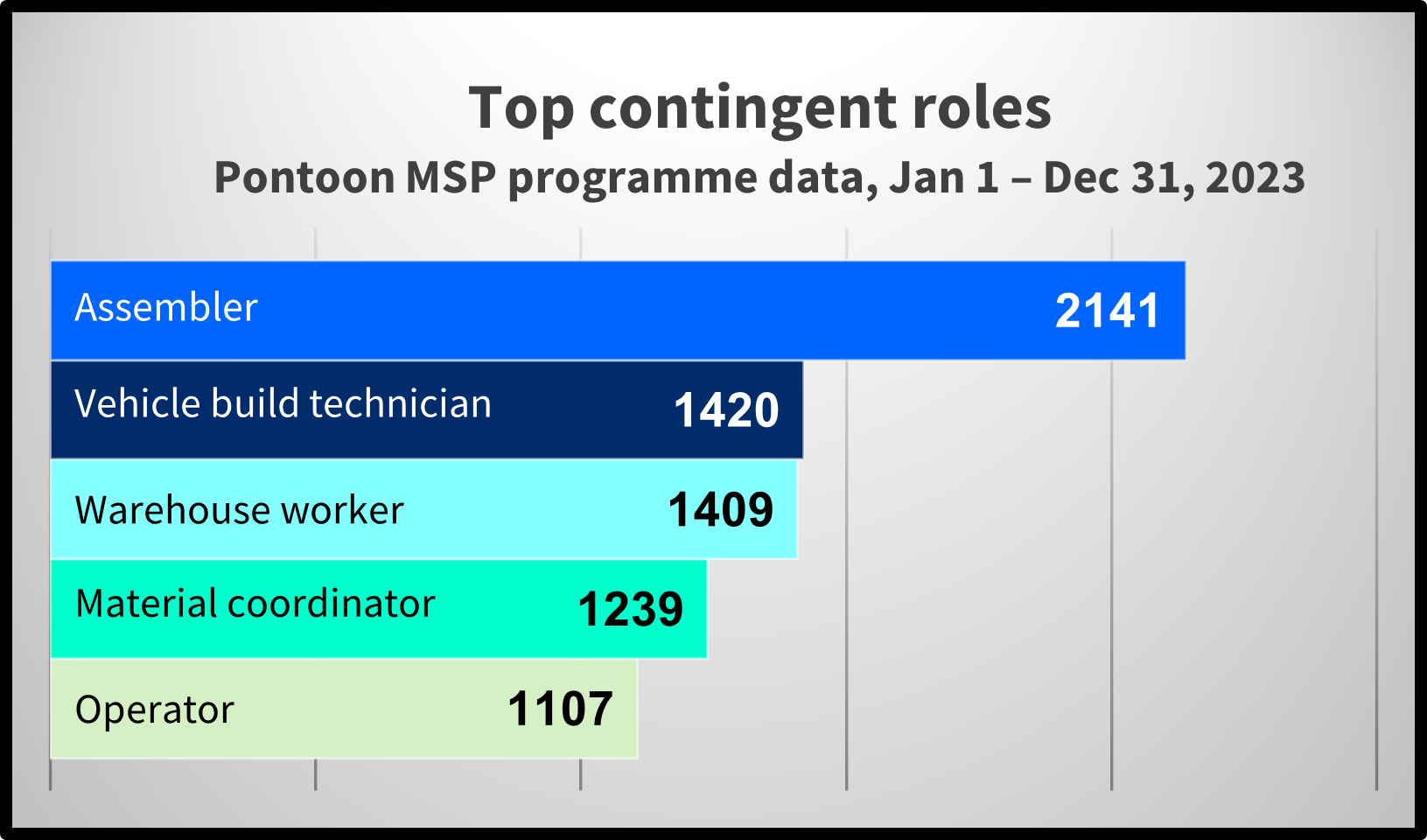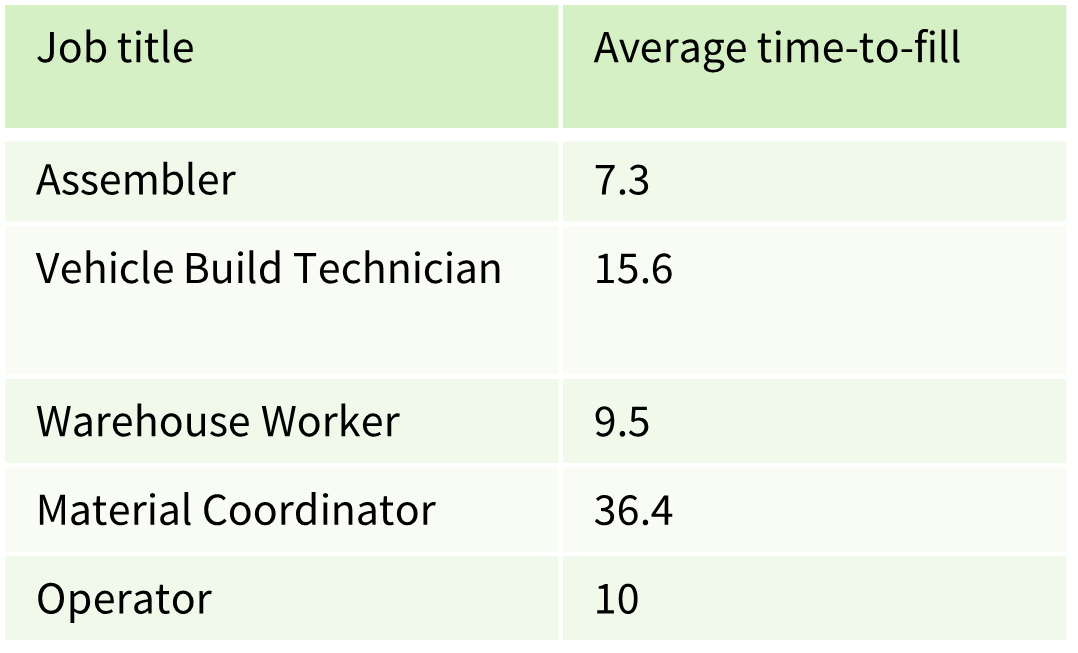Consumer Products Segment Burst: Winter 2024
Research
.
In the new volume of Consumer Products Segment Burst, we explore the most recent industry trends backed up by Pontoon’s proprietary data. Topics include: top contingent manufacturing roles, overcoming remote customer service challenges, and the most anticipated roles in the food & beverage industry 2024.
Exploring top manufacturing roles
From assembling intricate components to managing warehouse logistics, skilled professionals continue to play a pivotal role in the success of consumer products companies.
Pontoon’s Managed Service Provider (MSP) programmes reveal compelling insights into the demand for contingent roles in the Consumer Products, Life Sciences, and Industrials (CPLSI) segment. Notably, the top requested and filled contingent role in 2023 was Assembler.
While the overall employment of Assemblers and Fabricators is projected to decline by 6% in the United States from 2022 to 2032, the Bureau of Labour Statistics anticipates a consistent demand, projecting an average of 188,600 annual openings for these roles. This demand is driven by the necessity to replace retiring professionals and accommodate the evolving needs of the workforce. Pontoon’s data aligns with this projection, showcasing a persistent and high demand for Assemblers.
Complementing this vital role are other skilled labour positions such as Vehicle Build Technician, Warehouse Worker, Material Coordinator, and Operator – collectively constituting nearly 36% of contingent CPLSI roles filled by Pontoon in 2023. Noticeably, Material Coordinator is the only white-collar position in the set.

Our data suggests that with adequate support from an experienced MSP partner, filling blue-collar manufacturing roles can take from just over 7 business days for Assemblers to less than two weeks for Operators, Vehicle Build Technicians, and Warehouse Workers.
As white-collar professionals, Material Coordinators have the highest time-to-fill rate among these five roles. In their case, the time to fill amounts to over 36 days, which brings up the total average for all these roles to 15.7 days.
Thanks to Pontoon’s programme data, consumer products companies can better understand the manufacturing hiring landscape and hence prepare themselves better for the future.
Overcoming remote customer service challenges
Customer service is essential in the consumer products sector as it directly impacts client satisfaction, loyalty, and brand reputation, influencing purchasing decisions and long-term business success.
In 2024, the customer service industry emerges as a top sector for remote work, with 98% of employees expressing a desire for at least some form of remote working. Despite a decrease in remote call centre job postings from their peak in June 2022, they still linger at an impressive 228% higher than pre-pandemic levels.
Transitioning call centre agents to remote work, however, presents its own set of challenges. Remote workers may find themselves without immediate access to the tools available to their office counterparts, potentially leading to delays in resolving customer issues. Communication poses another challenge, as remote workers may struggle to interact with colleagues and managers.
To overcome these challenges, managers can adopt the following key best practices:
Collaborate: Encourage teamwork among remote team members through quality assurance systems, relationship building, and regular interaction. Leadership should take the lead in fostering communication within the team.
Encourage: Clearly communicate expectations and success criteria, motivating agents to make decisions within that framework. While providing autonomy, leaders should offer guidance and support through personal communication channels such as phone and video.
Be accountable: Leaders bear responsibility for the performance of remote call centre agents. Implement procedures to track output, express expectations clearly, use results-oriented data, and schedule regular check-ins to ensure obligations are met.
Successfully navigating the challenges of remote customer service demands a proactive approach from call centre managers. By embracing these best practices, leaders can cultivate a collaborative, motivated, and accountable remote team, ultimately contributing to enhanced performance and heightened customer satisfaction while making their call centre an appealing destination for skilled professionals.
Most anticipated roles in the food & beverage industry
A glance at the latest news in food and beverage manufacturing hints at a growing demand for specific roles as 2024 trends unfold.
Nutrition science and technology experts: The emphasis on personalised nutrition and better-for-you products requires experts in nutrition science and technology. Professionals who understand how to leverage generative artificial intelligence and technology for analysing health data will be in high demand.
M&A specialists: The surge in mergers and acquisitions indicates a need for specialists in M&A activities within the food industry. Professionals skilled in negotiations, market analysis, and integration strategies will be valuable for companies looking to strengthen their positions through acquisitions.
Sustainability experts: As sustainability remains a central focus, F&B companies will seek experts in sustainable practices, including environmentally friendly packaging, sourcing, and manufacturing. Professionals with knowledge of sustainable supply chain management will be essential.
Regulatory compliance and labelling specialists: With the anticipation of increased legal scrutiny and consumer awareness, companies will require experts in regulatory compliance and labelling. Professionals who can navigate evolving regulations and ensure accurate nutritional labelling will be crucial.
Pontoon’s recommendations
In 2024, food manufacturers will need to actively seek and attract talent with a blend of traditional food industry knowledge and expertise in emerging areas like technology, sustainability, and personalised nutrition. As such, F&B companies should:
- Offer continuous learning opportunities to existing employees to adapt to the evolving landscape and improve talent retention. As revealed by Pontoon’s most recent Global Workforce of the Future report, today’s workers are willing to stay with their companies if offered relevant upskilling opportunities.
- Attract talent through competitive compensation packages, especially for experts in high-demand areas like nutrition science, data analytics, and sustainability.
- Foster a company culture that aligns with the values of the workforce, particularly regarding sustainability and social responsibility to enhance employee satisfaction.
Related Post
The crucial role of an MSP Partner
An MSP partner plays a crucial part in unlocking the full potential of Contingent Workforce Management. Managed Services Provider (MSP) solutions play an increasingly ...




